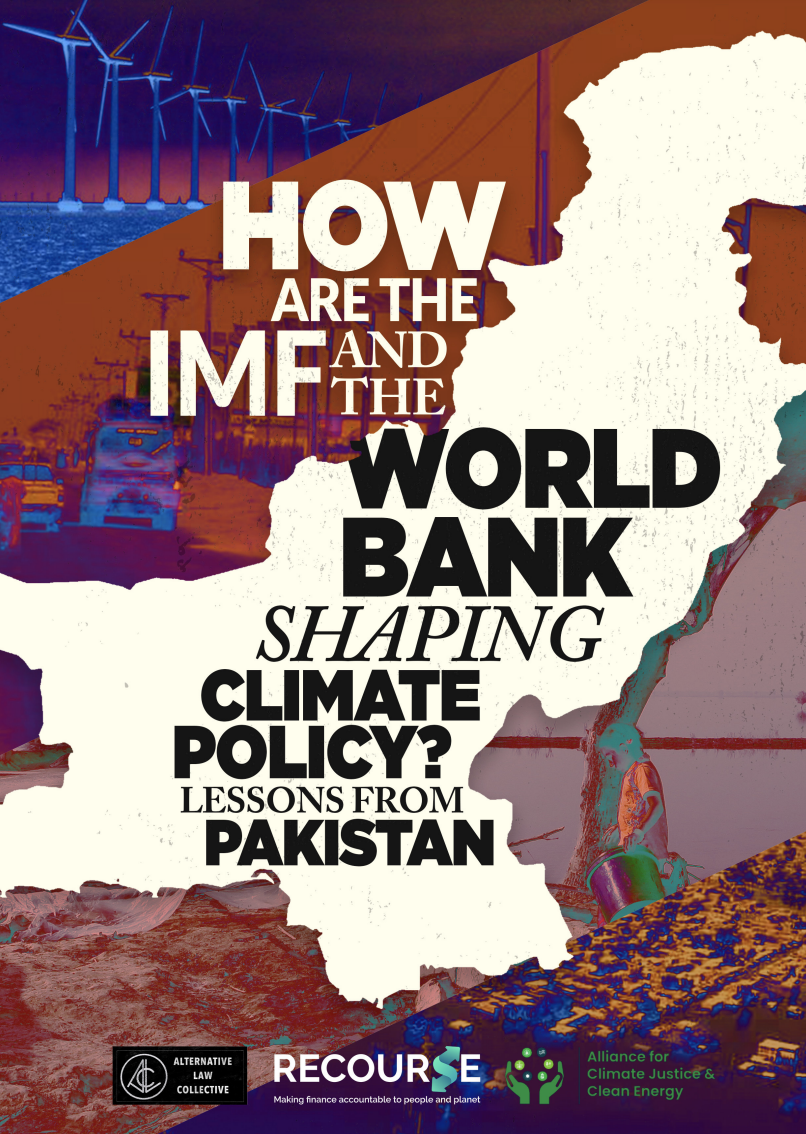- 03.10.2023
- Array
- The IMF and the WBG aim to scale up climate work in light of the IFI reform process, however, their current frameworks are ill-suited to respond to the climate crisis.
- IMF and WBG interventions in Pakistan have locked in fossil fuels, are responsible for large-scale hydro impacts, have failed to provide fiscal and policy space in the midst of the deadly 2022 floods and have led the country to tap into local coal reserves.
- CSOs call for proper ‘do no harm’ methodologies, governance reform, a review of their toolkits to ensure they are fit for purpose, non-debt-creating SDR rechanneling, and proper compensation for affected communities.
3 October, 2023 Amsterdam/Lahore – The World Bank Group (WBG) and International Monetary Fund (IMF) have failed to systematically review their policies and mandates to ensure they become more resilient, democratic, accountable and aligned with achieving the climate goals, according to a new report by Alternative Law Collective, the Alliance for Climate Justice and Clean Energy and Recourse.
The report titled How are the IMF and the World Bank Shaping Climate Policy? Lessons from Pakistan examines the limitations of WBG’s Climate Change Action Plan and the IMF’s Climate Change Strategy and assesses the negative impacts of climate-related interventions in Pakistan in the last decades.
The findings of this report have been released ahead of the World Bank and IMF annual meetings during which the World Bank Group is expected to present an update to its Evolution Roadmap – a document that lays out the process through which the Bank will aim to address development challenges such as poverty, shared prosperity, inequality, and cross-border challenges including climate change. The IMF is also expected to outline its policies, including an update on the expansion of the scope of its work on climate.
The IMF, WBG and Pakistan
Pakistan has an extensive history of 23 IMF programs and over $40 billion in WBG investments. These include the WBG-sponsored energy policy that had special incentives for fossil fuel independent power producers (IPPs) at its centre, its lobbying to include harmful large-hydro in the renewables policy. Whereas, the IMF programmes in the recent years have failed to provide support for adaptation and mitigation in light of the pandemic, the spike in fossil fuel prices and interest rates and the 2022 floods.
Consumer energy subsidies phaseout is at the centre of IMF’s policy conditionalities in Pakistan, which led to a spiral in inflation in the midst of the 2022 floods that affected 33 million people, destroyed 1.7 million homes, with losses estimated at $40 billion. Both institutions fail to recognise the role of the failed WBG-led energy policy that led to overcapacity, energy companies indebtedness and was unsuccessful in scaling up energy access through sustainable renewables. Rather, the WBG is championing large-hydro projects that ignore climate risks as was previously the case withLeft Bank Outfall Drain (LBOD)and Tarbela dam.
The recommendations of the report calls for these institutions to be more accountable and democratic through a review of toolkits, including the need for impact assessments, debt sustainability analysis, proper compensation to affected communities, and immediate amendments to current loans, including the IMF’s Stand-by Arrangement (SBA) and WBG’s Pakistan Program for Affordable and Clean Energy (PACE).
“Floods are a permanent part of our lives since the [WBG-backed] LBOD [hydro project was constructed]. We learned to adapt through our own resources. Before the monsoon, we would sell a camel and migrate to another location. This year, the IMF negotiations increased petrol prices so much that we had to take loans just to put food on the table. We no longer have the option to migrate and are left with hoping there are no floods again this year,” Aslam, a resident of Badin in Sindh province, which was severely affected by the 2022 floods reports that.
“The WBG and IMF’s interventions analysed by this report reveal a shared structural failing in the underlying analytic and developmental logic currently driving their climate-related operations. These institutions have generally followed an ahistoric and siloed approach that fails to recognize the interactive and dynamic interlinkages between their fiscal and macroeconomic policies, and the broader everyday realities of economic exploitation, gender inequality, and climate change – in both the short-term and longer-term time frames,” stated Zain Moulvi, Research Director at Alternative Law Collective.
Federico Sibaja, IMF Campaign Manager at Recourse said, “The limited and weak ‘reform’ agenda of the IFIs coupled with their expanding interventionist power under the guise of climate action, raises serious concerns for Global South nations struggling to chart an effective climate-compatible developmental path. Given that there is little change in the old developmental thinking underpinning IFI operations (or in the global financial architecture as a whole), their mainstreaming of climate and ramping up of coordination carries a real danger of deepening the climate crises in Global South nations”.
For more information, contact:
Zain Moulvi, Research Director at Alternative Law Collective, +92 336 4307567, zainmoulvi@gmail.com
Federico Sibaja, IMF Campaign Manager at Recourse, +32 491 199367, federico@re-course.org
